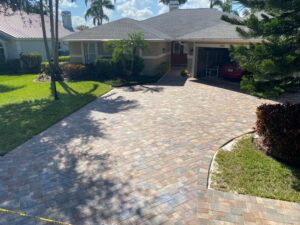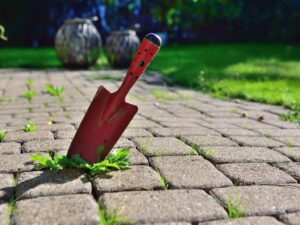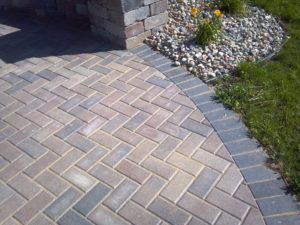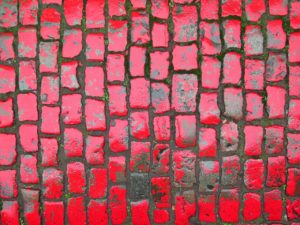Pavers have been a staple element of hardscape for decades now. Still, many homeowners don’t have a clear idea of how much pavers are worth. So what is the cost of pavers per square foot in 2024?
It should be clear that the answer is directly related to the type of pavers you choose.
While it seems like a high investment – and to some extent, it is – in this article, we will cover topics that will clarify, once and for all, your main doubts about the costs of pavers per square foot and why they are worth every penny of the investment.
You may also like: Do I need a permit to hardscape? All you need to know
What is the cost of pavers per square foot in 2024?
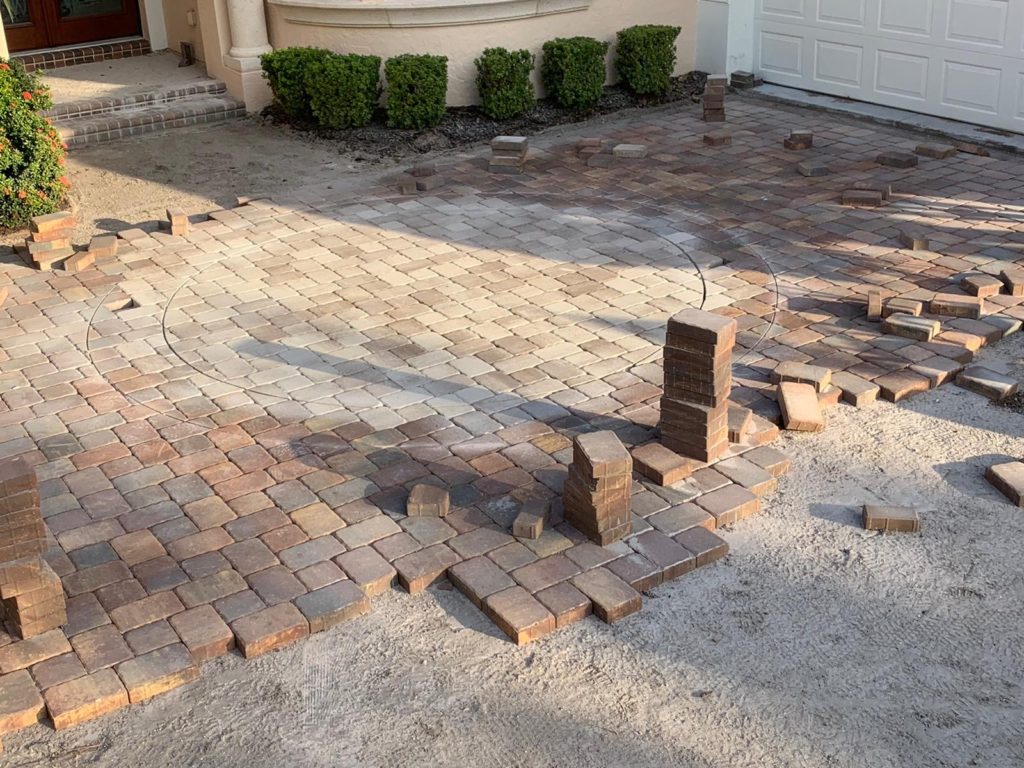
Let’s start with the prices. The chart below will give you a basic idea of the cost of pavers per square foot:
| Per Paver | Per Square Foot | |
| Brick (Real Clay) | $0,25 — $4 | $4 — $8 |
| Thin Clay (Half Bricks) | $0,25 — $2 | $3 — $5 |
| Tumbled Concrete Brick | $0,50 — $5 | $3 — $5 |
| Thin Concrete Pavers | $0,50 — $10 | $2,50 — $5 |
| Interlocking Concrete | $0,50 — $15 | $3 — $6 |
| Stone Style Concrete Pavers | $3 — $20 | $7 — $16 |
| Natural Stone & Slate Pavers | $3 — $20 | $7 — $16 |
As you can probably tell, the price range is highly variable, at least for some options. This is related to two main factors:
- Production process;
- The cost or difficulty of obtaining the raw material.
Therefore, even the same type of pavers can be found in different price ranges depending on whether they are found or produced closer to you, significantly reducing transportation costs.
Concrete slabs or pavers? What is cheaper?
Right off the bat, prices can be a little intimidating. However, pavers pay off in the end, especially compared to their direct competitor.
Concrete slabs typically cost about $6 per square foot (installation included), so although relatively cheaper than some options above, when maintenance and repair costs start to kick in, they become the more expensive choice.
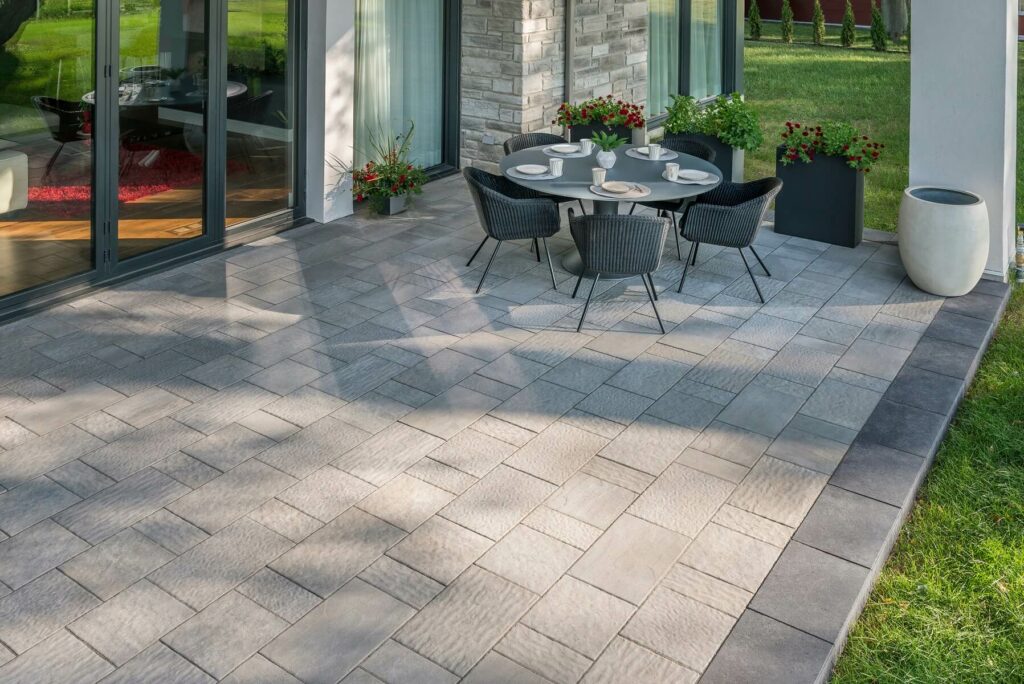
Pavers have 3 very distinct advantages when compared to concrete, they are:
- Aesthetics
Visually speaking, paver designs are much more beautiful. This appeal can be explained by the fact that pavers come in different colors, shapes, and textures.
Although concrete can also be stamped to resemble pavers, it’s not even close to the real deal. - Durability
Both, pavers and their installation process, have been developed to last for decades and continue to look as if just recently installed.
The soil, due to natural characteristics, tends to shift. Pavers’ installation allows it to be malleable to the ground, and these variations are unlikely to affect them.
Concrete slabs don’t have this same flexible characteristic. Most of the cracks on the concrete slabs’ surface are the aftermath of this shifting of the soil. - Maintenance
The process of pavers’ maintenance, cleaning, and sealing, allows it to continue looking as if they were just recently installed. Learn all about paver maintenance in this article.
Concrete slabs, on the other hand, may start to show cracks, even within the first week. Unlike pavers, where you only need to replace the damaged blocks, you have to remove the concrete slab completely to deposit a new layer in its place.
Therefore, it’s clear that although it appears that the cost of a concrete slab is cheaper, eventually, it becomes more expensive in the long run.
How long do paver patios last?
Just as important as knowing the cost of pavers per square foot is, of course, to know how long they last.
After all, to assess if pavers are worth the investment, many aspects must be taken into account, in addition to the cost of pavers per square foot. Just like any other construction work, you need the assurance and peace of mind that you are making a good investment.
The good news is that, with periodic maintenance, pavers last for decades without requiring any heavy maintenance. And even after decades, the fact that you can simply replace damaged pavers with new ones further enhances this durability.
When we say “periodic maintenance”, we mean simple steps like removing weeds that may grow between joints or cleaning with a broom and water hose to remove residues deposited on pavers. Simple actions that generate an extremely positive impact on pavers’ durability.
Read as well: Paver discoloration – Why does it happen?
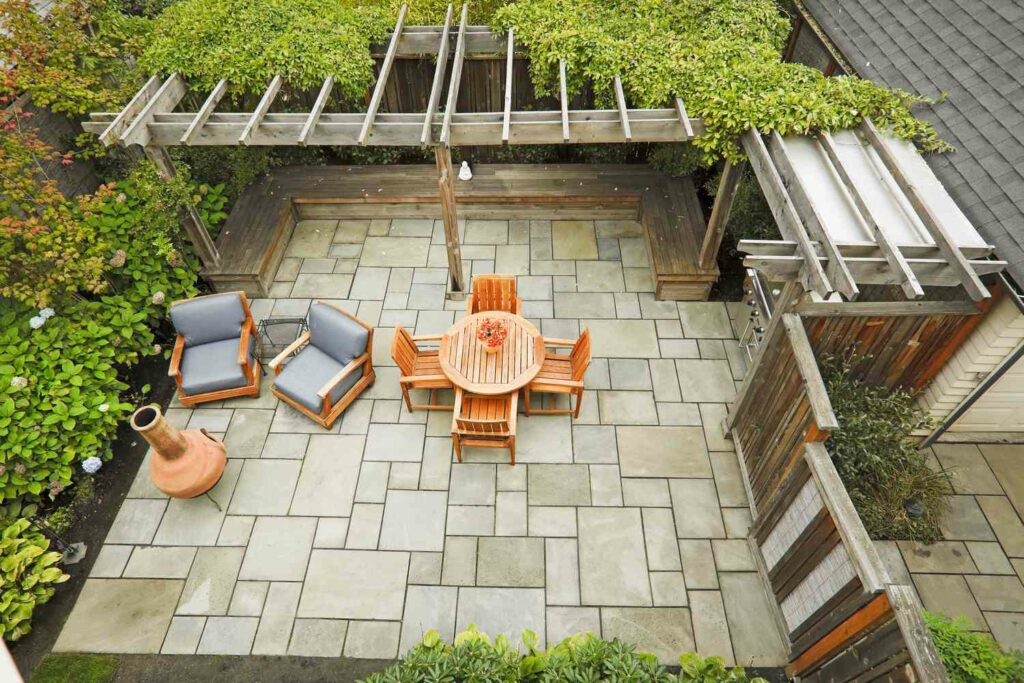
Do pavers add value to your home?
To fully understand the cost of pavers per square foot, it is important to know if they are worth it in the long run.
We would like to ensure that, whatever your choice of pavers is, it’s worth the money. There are fewer projects nowadays that add more value to your property than pavers. Whatever the amount you invest in the project, you can expect at least 75% ROI (Return on investment).
We have a complete discussion about how pavers increase home value in this other article.
It’s not hard to understand why pavers add so much value. Pavers allow you to be creative in your design, so you will hardly find a project similar to yours. Pavers allow you to add a personal touch, whether on your driveway, your walkway, around the pool, or your living space; in short, the options are countless.
Get professional hardscape services with top-quality pavers!
S&S Pavers has been proudly serving the counties of Manatee and Sarasota for the past 10+ years – providing the backbone that supports and enhances the overall aesthetic and functionality of a space.
Contact us anytime for a free estimate on our services so we can start helping you with your hardscape project as soon as possible! We’ll be waiting for you.
FAQ
Is it cheaper to lay concrete or pavers?
Technically, concrete is cheaper upfront. However, pavers are by far superior due to their sheer value and longevity. While poured concrete lasts at most one year without starting to break, pavers can last for a lifetime as long as they are properly installed and cared for.
What does it cost to have pavers installed?
Using as a base of comparison a typical 280 square feet paver installation, the low end can be about $2400 while the top end can reach as high as $7,000. So, on average, a 280-square-foot installation roughly costs $3,400.
What is the cheapest patio paver?
Bricks are usually the cheapest form of paver, costing about $6-$10 per square foot.
Do pavers need to be sealed?
Yes. Sealing is a very important part of a paver installation, as it protects your pavers from spills and prevents the accumulation of weeds and moss in between the grout lines.
Are pavers worth the money?
Very much. Pavers have a high resale value, and they can add tons of value to any property.
What is the difference between pavers and stepping stones?
Pavers are small elements that interlock together to create a whole, resistant structure. Stepping stones on the other hand can be used individually for a specific path or undefined area and (although it is recommended) do not require a prepared base for installation.

